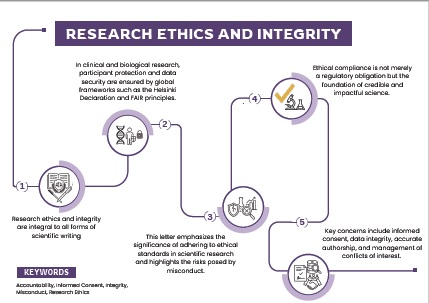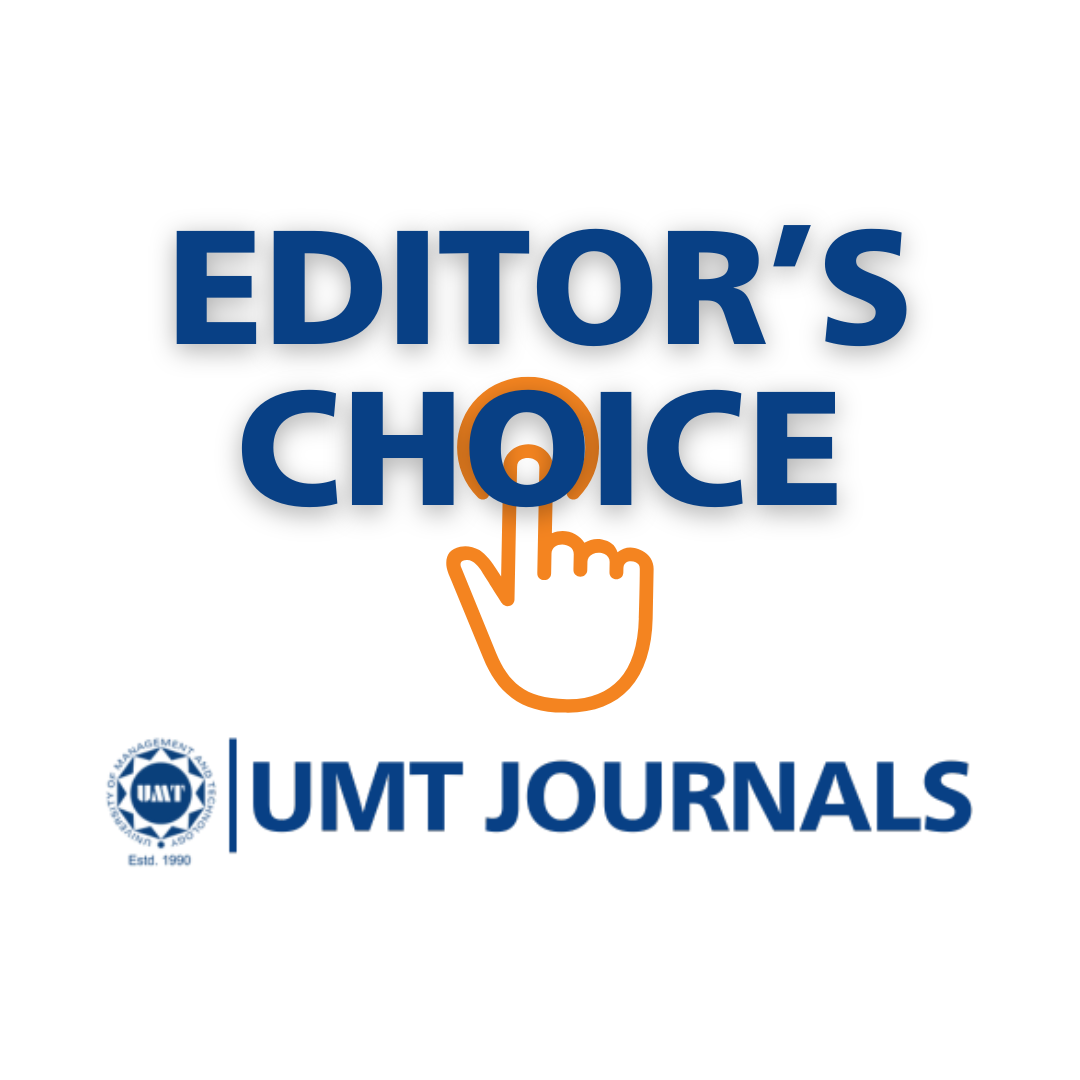Ethics and Integrity: Essential Pillars of Research
Abstract
 Abstract Views: 0
Abstract Views: 0
Autonomy, justice, and beneficence are the principles which inform the spirit of scientific research. Further, integrity and ethics are essential pillars of research, followed by respect, transparency, and accountability. This letter to the editor highlights the importance of integrity and ethics in research. It also sheds light on the misconduct related to scientific research writing. Integrity and ethics are important aspects in research and scientific writings. Various international standards are to be followed in biological, clinical, and health sciences research, such as the Declaration of Helsinki and FAIR principles. Scientific journals and publishers strictly ask authors and researchers to follow guidelines and ensure that issues and challenges related to misconduct are overcome. Authors are asked to declare all details related to the patients’ or participants’ informed consent form, integrity of data, authorship criteria, and conflict of interest declaration statement. Currently, it is observed that plagiarism, fabrication, and falsification are the most common misconducts during research writing, undermining the credibility of scientific writing. Public trust can be obtained by following the ethical rules and regulations related to research integrity which, in turn, would definitely improve the overall quality of scientific writing.
Downloads
References
Iphofen R. Handbook of Research Ethics and Scientific Integrity. Springer; 2020.
Muthanna A, Chaaban Y, Qadhi S. A model of the interrelationship between research ethics and research integrity. Int J Qual Stud Health Well-Being. 2024;19(1):e2295151 https://doi.org/ 10.1080/17482631.2023.2295151
Magalhães S. Ethics and integrity in research: why bridging the gap between ethics and integrity matters. J Acad Ethics. 2024;22(1):137–147. https://doi.org/10.1007/s10805-024-09504-z
Ali M. Publication bias: a brief concept note. Curr Pharm Res. 2025;3(2):1–6. https://doi.org/10.32350/cpr.32.01
Publication bias, however, poses a substantial threat to the integrity of scientific research, impacting the validity and reliability of the findings. Selective reporting of statistically significant data may result in an exaggeration of treatment effects, misleading meta-analyses, and inappropriate clinical practices.
Henkel J, Schöberl S, Alexy O. The emergence of openness: how and why firms adopt selective revealing in open innovation. Res Policy. 2014;43(5):879–890, https://doi.org/ 10.1016/j.respol.2013.08.014
Foláyan MO, Haire B. What's trust got to do with research: why not accountability? Front Res Metrics Anal. 2023;8:e1237742, https://doi. org/10.3389/frma.2023.1237742
Edwards A. Responsible research: ways of being a researcher. British Edu Res J. 2002;28(2):157–68. https://doi.org/10.1080/01411920120122121
Sempa JB, Patil R, Mathewson JD, et al. Aligning the principles and practice of research integrity and research fairness in global health: a mixed-methods study. BMJ Glob Health. 2024;9(3):e013917. https://doi.org/ 10.1136/bmjgh-2023-013917
Jawa NA, Boyd JG, Maslove DM, Scott SH, Silver SA. Informed consent practices in clinical research: present and future. Postgrad Med J. 2023;99(1175):1033–1042. https:// doi.org/10.1093/postmj/qgad039
Temara S. Ethics for responsible data research: integrating cybersecurity perspectives in a digital era. In: Throne R, ed. IRB, Human Research Protections, and Data Ethics for Researchers. IGI Global Scientific Publishing; 2025:103–44. https://doi.org/10.4018/979-8-3693-3848-3.ch005
Chaddah P. Ethics in research publications: fabrication, falsification, and plagiarism in science. In: Academic Integrity and Research Quality. University Grants Commission; 2021:18–33.
Bhaskar R, Ola M. Publication misconduct, plagiarism, and research integrity. In: Saharan VA, Kulhari H, Jadhav HR, eds. Principles of Research Methodology and Ethics in Pharmaceutical Sciences. CRC Press; 2024:271–310.
Rennie D, Gunsalus CK. What is research misconduct? In: Wells F, Farthing M, eds. Fraud and Misconduct in Biomedical Research. CRC Press; 2019:29–51.
Gul S, Parveen Q, Yousuf MI. Role of research supervisors to implement ethical practices in research of social sciences. Pak Soc Sci Rev. 2021;5(4):737–751. http://doi.org /10.35484/pssr.2021(5-IV)56
This study makes recommendations for raising student understanding of research policies and provides statistical evidence for developing policies and guidelines to prevent unethical behavior at university level.
Resnik DB, Shamoo AE. Fostering research integrity. Account Res. 2017;24(6):367–372. https://doi.org /10.1080/08989621.2017.1334556
Kretser A, Murphy D, Bertuzzi S, et al. Scientific integrity principles and best practices: recommendations from a scientific integrity consortium. Sci Eng Eth. 2019;25:327–355. https:// doi.org/10.1007/s11948-019-00094-3
Reer A, Wiebe A, Wang X, Rieger JW. FAIR human neuroscientific data sharing to advance AI driven research and applications: legal frameworks and missing metadata standards. Front Genet. 2023;14:e1086802. https://doi. org/10.3389/fgene.2023.1086802
Kurihara C, Inoue K, Kai H, et al. Our “WMA Declaration of Helsinki”: opinions and proposals from patient and public for research ethics. In: Kurihara C, Greco D, Dhai A, eds. Ethical Innovation for Global Health: Pandemic, Democracy and Ethics in Research. Springer; 2023:243–269. https://doi.org/10.1007/978-981-99-6163-4_13
Nagai H, Nakazawa E, Akabayashi A. The creation of the Belmont Report and its effect on ethical principles: a historical study. Monash Bioethics Rev. 2022;40(2):157–170. https:// doi.org/10.1007/s40592-022-00165-5
Caplan AL, Redman BK. Getting to Good: Research Integrity in the Biomedical Science. Springer; 2018.

Copyright (c) 2025 Muhammad Ali, Noor Kamil, Hafiz Muhammad Mazhar Asjad, Sana Ejaz

This work is licensed under a Creative Commons Attribution 4.0 International License.
BSR follows an open-access publishing policy and full text of all published articles is available free, immediately upon publication of an issue. The journal’s contents are published and distributed under the terms of the Creative Commons Attribution 4.0 International (CC-BY 4.0) license. Thus, the work submitted to the journal implies that it is original, unpublished work of the authors (neither published previously nor accepted/under consideration for publication elsewhere). On acceptance of a manuscript for publication, a corresponding author on the behalf of all co-authors of the manuscript will sign and submit a completed the Copyright and Author Consent Form.










